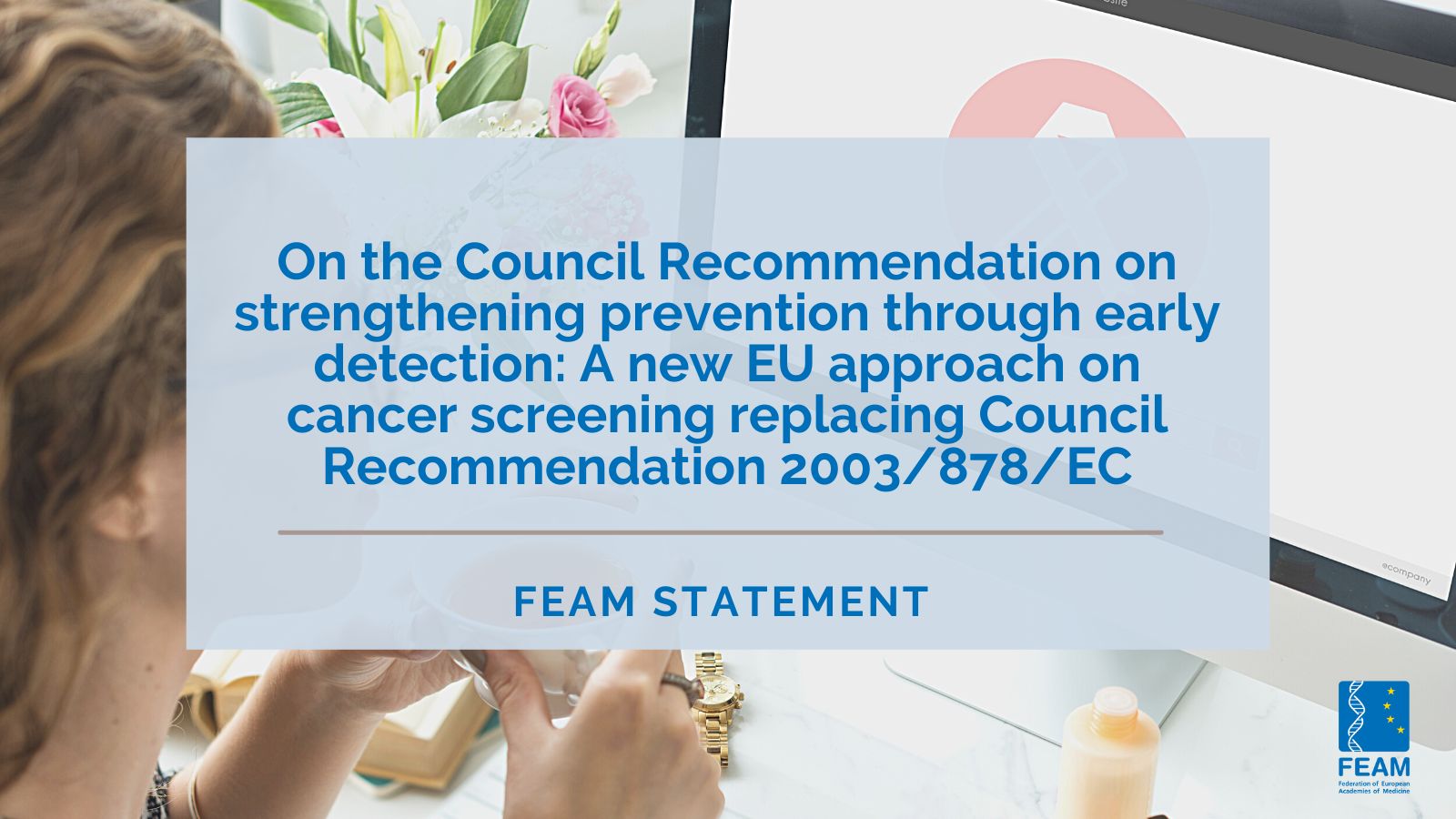
On 9 December 2022, the Council of the European Union presented its amendments and adopted the proposal made by the European Commission in September 2022, on strengthening prevention through early detection: A new EU approach on cancer screening, a document that aims to replace the Council recommendations of 2003/978/EC.
The Commission’s proposal made ambitious, evidence-based recommendations for cancer screening, building on the work produced by the Commission’s Scientific Advice Mechanism, including reports from SAPEA (Science Advice for Policy by European Academies) and the Group of Chief Scientific Advisors (SAM). These conclusions were based on scientific evidence and discussed by the panel of experts from all over Europe.
Despite some fine tuning, FEAM acknowledges the effort of the Council of the European Union to include the recommendations expressed in the initial document. We also acknowledge that not all Member States possess the same financial and material resources to take forward all the recommendations proposed by the SAM. Overall, this is a responsible outlook that takes into account the specificities of the Member States and contributes to the expanding of cancer screening practices in the European Union.
FEAM welcomes the recommendations in the case of breast, cervical and colorectal cancers, which reflect the substance of what has been proposed. We also welcome the inclusion of the expansion of screening for lung, prostate and gastric cancers. However, the step-wise approach to screening in these cases seems rather lacking in ambition, although we recognise that not all countries would have the necessary capacity to implement a more robust system at this time.
We also underline the importance of the Commission in maintaining the review of progress in all Member States, helping to ensure consistency and quality and to embrace change as new evidence becomes available.
Final recommendations adopted by the Council of the European Union
Breast cancer:
Considering the evidence presented in the European guidelines, breast cancer screening for women aged 50 to 69 with mammography is recommended. A lower age limit of 45 years and an upper age limit of 74 years is suggested. The use of either digital breast tomosynthesis or digital mammography is suggested. The use of magnetic resonance imaging (MRI) should be considered when medically appropriate.
Cervical cancer:
Testing for human papilloma virus (HPV) was recommended using only clinically validated assays as the preferred screening tests for women aged 30 to 65 with an interval of five years or more. Consider adapting ages and intervals to individual risk based on the HPV vaccination history of the individuals and also consider the possibility of offering kits allowing women to take a self-sample, especially for non-responders to screening invitations.
Colorectal cancer:
Quantitative faecal immunochemical testing (FIT) is considered the preferred screening test for referring individuals for follow-up colonoscopy between 50 and 74 years old. Quantitative information from FIT results might be used on the basis of further research with a view to implement risk-tailored strategies, introducing thresholds defined per sex, age and earlier test results. Endoscopy may be adopted as a primary tool to implement combined strategies.
Lung cancer:
Considering the preliminary evidence for screening with use of low-dose computed tomography, and the need for a stepwise approach, countries should explore the feasibility and effectiveness of this programme, for instance by using implementation studies. The programme should integrate primary and secondary prevention approaches, starting with high risk individuals. Special attention should be given to the identification and targeting of high risk profiles, starting with heavy smokers and ex-smokers who used to smoke heavily, and Member States should further research how to reach and invite the target group, as there is no systematic data (documentation) on smoking behaviour. Furthermore, attention should be given to the identification and targeting of other high risk profiles.
Prostate cancer:
Considering the preliminary evidence and the significant amount of ongoing opportunistic screening, countries should consider a stepwise approach, including piloting and further research, to evaluate the feasibility and effectiveness of the implementation of organised programmes aimed at ensuring appropriate management and quality on the basis of prostate-specific antigen (PSA) testing for men, in combination with additional magnetic resonance imaging (MRI) scanning as a follow- up test.
Gastric cancer:
Screen-and-treat strategies for Helicobacter pylori, including implementation studies, should be considered in those countries or regions inside countries with high gastric cancer incidence and death rates. Screening should also address strategies for identification and surveillance of patients with precancerous stomach lesions unrelated to Helicobacter pylori infections.
Supporting Documents: